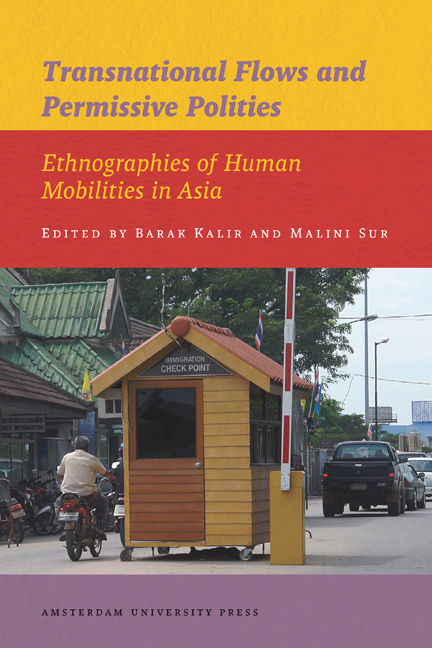Book contents
- Frontmatter
- Contents
- List of Tables, Maps, Figures and Photographs
- Acknowledgements
- Introduction: Mobile Practices and Regimes of Permissiveness
- 1 Illegality Rules: Chinese Migrant Workers Caught up in the Illegal but Licit Operations of Labour Migration Regimes
- 2 Contesting the State of Exception in the Afghan-Pakistani Marchlands
- 3 ‘Looking for a Life’: Rohingya Refugee Migration in the Post-Imperial Age
- 4 Smuggling Cultures in the Indonesia-Singapore Borderlands
- 5 Trade, Transnationalism and Ethnic Infighting: Borders of Authority in Northeast Borneo
- 6 Bamboo Baskets and Barricades: Gendered Landscapes at the India-Bangladesh Border
- 7 Moving between Kerala and Dubai: Women Domestic Workers, State Actors and the Misrecognition of Problems
- 8 Emigration of Female Domestic Workers from Kerala: Gender, State Policy and the Politics of Movement
- 9 Mainland Chinese Migrants in Taiwan, 1895-1945: The Drawbacks of Being Legal
- 10 ‘Playing Edge Ball’: Transnational Migration Brokerage in China
- Epilogue: Irregular Mobilities and Disjunctive Moralities
- About the Editors and Contributors
- Bibliography
- Index
- Publications Series
1 - Illegality Rules: Chinese Migrant Workers Caught up in the Illegal but Licit Operations of Labour Migration Regimes
Published online by Cambridge University Press: 15 January 2021
- Frontmatter
- Contents
- List of Tables, Maps, Figures and Photographs
- Acknowledgements
- Introduction: Mobile Practices and Regimes of Permissiveness
- 1 Illegality Rules: Chinese Migrant Workers Caught up in the Illegal but Licit Operations of Labour Migration Regimes
- 2 Contesting the State of Exception in the Afghan-Pakistani Marchlands
- 3 ‘Looking for a Life’: Rohingya Refugee Migration in the Post-Imperial Age
- 4 Smuggling Cultures in the Indonesia-Singapore Borderlands
- 5 Trade, Transnationalism and Ethnic Infighting: Borders of Authority in Northeast Borneo
- 6 Bamboo Baskets and Barricades: Gendered Landscapes at the India-Bangladesh Border
- 7 Moving between Kerala and Dubai: Women Domestic Workers, State Actors and the Misrecognition of Problems
- 8 Emigration of Female Domestic Workers from Kerala: Gender, State Policy and the Politics of Movement
- 9 Mainland Chinese Migrants in Taiwan, 1895-1945: The Drawbacks of Being Legal
- 10 ‘Playing Edge Ball’: Transnational Migration Brokerage in China
- Epilogue: Irregular Mobilities and Disjunctive Moralities
- About the Editors and Contributors
- Bibliography
- Index
- Publications Series
Summary
This chapter explores the immigration of Chinese migrant workers to Israel in light of the ‘illegal but licit’ analytical framework as advanced by Van Schendel and Abraham (2005). The ‘illegal but licit’ analytical framework conceptualises a useful distinction between the il/legal and the il/licit, in order to enable us to grasp better, and talk about, what really happens on the ground – in, across and under the formal authority of nation-states. The ‘illegal but licit’ framework broadens and forces our analysis to include flows and actions that are located in a zone where a mismatch exists between the state's formal political authority and non-formal social authority.
The first aim of this chapter is to examine the immigration flow from the viewpoint of Chinese migrant workers, who must go through numerous informal and illegal stages in the process of recruitment and employment. Migrants regularly perceive their own actions as well as those of recruitment companies and employers to be licit. Yet, the licitness in this case is often the product of a culturally infused confusion or plain ignorance regarding the obliging legal systems in China and Israel. Notably, instead of there being an institutional attempt to offset the confusion of migrant workers, this confusion is being systematically compounded by deliberate manipulations of Chinese and Israeli recruitment companies and employers.
The second aim of the chapter is to examine closely the work of the formal authorities in China and Israel. As I shall demonstrate, the two states choose to accommodate and turn a blind eye to the informal and illegal dealings of private and public companies involved in the recruitment and employment of Chinese workers. At times, states also act against migrant workers using illegal methods. I therefore argue that our understanding of the role of the state within the ‘illegal but licit’ framework should not be confined to policymaking and the fixing of legal boundaries but instead should include a treatment of the executive powers of states within the field of immigration.
- Type
- Chapter
- Information
- Transnational Flows and Permissive PolitiesEthnographies of Human Mobilities in Asia, pp. 27 - 54Publisher: Amsterdam University PressPrint publication year: 2012



